Cloud ERP Selection: 4 Platform Pitfalls
Considering the purchase of any fully-integrated enterprise system can offer a daunting challenge. In this event, there are critical elements that require more than just a passing understanding of ‘how and why’ a particular company behaves the way it does. Ignore any of these elements run the risk of creating a ‘doughnut hole’ condition where any system appears to work just fine right up to the moment when ‘that one’ process or requirement goes missing at the wrong time.
This challenge is considerably enhanced when it comes to selecting cloud ERP systems, since these systems operate on a perpetual processing basis; meaning that more often than not the active process chain running from Inventory input to AP output processes and analyzes information all day, every day. Unfortunately, regardless of the list of known concerns, companies still get ERP selection wrong for a host of reasons. Be sure you consider these potential problem areas before they become cloud-based cautionary tales.
1. Cloud ERP Scalability
The effective validation of a cloud ERP implementation is highly-dependant on how a particular company’s need for data granularity evolves, and how quickly that company intends to enhance its operational planning year-over-year. In this event, while an actual list of concerns are typically long and deep, at the end of the day, nearly all elements generally relate to the strength or weakness of a company’s active growth pattern. This means that if you have purchased a system that is not flexible enough to deal with regular operational expansion, at some point the company is going to hit the growth wall; this will usually be at the most inopportune moment in the business life cycle. Given that one of the definitive benefits of cloud ERP is its inherent scalability, you can’t afford to make errors in this particularly department.
Recommended reading: five cloud ERP mistakes you need to avoid.
2. Cloud ERP Speed
For small businesses, utilizing just one or two cloud-based ERP modules, concerns associated with the speed of data throughput is not typically seen to be a challenge. However, as a company grows, the constant need to evolve its process-chain beginning with the receipt of raw data leading to the delivery of useful information becomes much more critical on a daily basis. Therefore, in the same way that a cloud ERP system may or may not be flexible enough to accept overall growth quickly, the same can be said about the speed of overall data throughput from the cloud to the company and back.
3. Cloud ERP Complexity
At an intrinsic level, all cloud-driven ERP systems can be seen as being complex; but there is complex, and then there is COMPLEX, depending on how, where, and when information must be delivered and managed by the corporate customer. Therefore, if business has selected cloud ERP that appears to be ‘easy to use’ (in other words, simplistic), it is likely that the system will fail to provide enough sophistication as the constant transition from small business to mid to large Enterprise evolves downstream.
4. Cloud ERP Dependability
Enterprise systems are only as useful as their level of dependability, and this awareness is particularly critical when it comes to cloud ERP-dependant companies. The reason for this is simple; because of the generally deep knowledge-value provided by ERP and its operational tenets, companies tend to bank on the information provided by one or more implemented cloud ERP modules. However, if that company suddenly finds itself missing critical information in the event of cloud ERP downtime, the entire operational chain can be broken, leading to the loss of needed periodic revenue or worse.
Free white paper
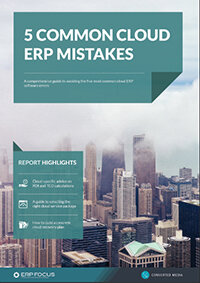
Five common cloud ERP mistakes
Get your comprehensive guide to avoiding the five most common cloud ERP errors
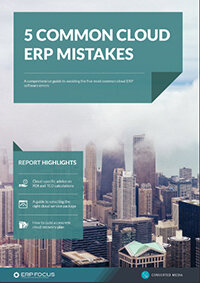
Featured white papers
-
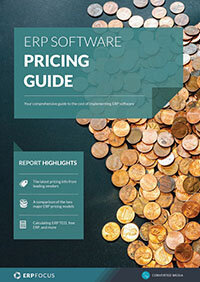
ERP Software Pricing Guide
Get the latest pricing information on over 80 popular ERP systems, and learn how to budget for your ERP project in our free guide
Download -
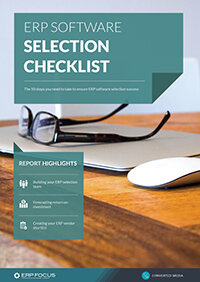
60-Step ERP Selection Checklist
Get the comprehensive checklist for your ERP selection project
Download -
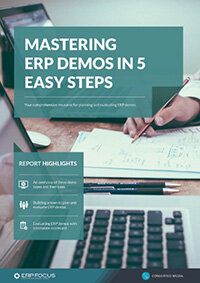
ERP Demo Guide & Scorecard
Master your ERP demo with 5 easy steps using our free guide (includes demo scorecard)
Download
Related articles
-

The best ERP systems for process manufacturing
Consider these ERP systems when selecting your next process manufacturing ERP
-

CMMC Compliance: What Aerospace and Defense Manufacturers Need to Know
Key insights on CMMC compliance, deadlines, and securing DoD contracts with CMMC 2.0 certificatio...
-

5 ERP pricing definitions you need to understand
Have you mastered the ERP pricing lexicon yet? Getting to grips with these five definitions is a ...

